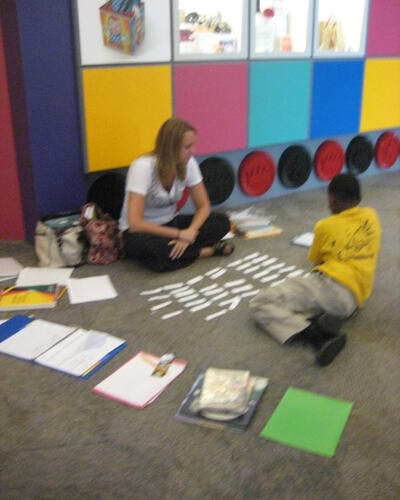Dr. Peck has been a member of the Geneseo faculty since 2000.
Visit Sharon M. Peck's web page.

Office Hours
Curriculum Vitae
Education
University at Albany 2000
University at Albany 1994
SUNY Plattsburgh 1992
Employment
Urban Literacy Clinics: Dr. Peck offers CURR 513 our literacy clinical practicum with urban partners including The Community Place of Greater Rochester and The Horizons Program at The Harley School
Dr. Peck is active with school partnerships, community partnerships and providing inservice programs for the Rochester City School District.
Affiliations
North East Regional Director, Puppeteers of America
Reviewer, Auditor, NCATE/IRA
Reviewer: The Reading Teacher, Journal of Literacy Research, Networks
League for Advancement of New England Storytelling
Publications
Peck, S.M. (2010) Lessons from an award winning urban elementary school. The Reading Teacher, International Reading Association. 65 (5) pp.394-403.
Peck, S.M. (2010) Puppetry on Broadway: Recognizing the Tradition, chapter in Encyclopedia of Broadway and American Culture, Thomas Greenfield (Ed.), Greenwood Publishing.
Peck, S.M. (2009) Preparing Literacy Teachers to Meet the Needs of Diverse Students: Lessons from Urban Literacy Clinics Chapter in: Evidence-Based Quality Literacy Tutoring Programs: What Works and Why, Janet Richards and Cynthia Lassonde, Editors , International Reading Association, Newark,DE.
Pitcher, S., Albright, L.K., DeLaney, C.J., Walker, N.T.,Seunarinesingh, K., Mogge, S. Headley, K.N., Victoria Gentry Ridgeway, V., Peck, S.M., Hunt, R., Dunston, P.J. (2007) Assessing Adolescents Motivation to Read. Journal of Literacy Research v50 n5 p378-396.
Peck, S. M., Virkler, A., (2006) Reading in the Shadows: Extending literacy skills through shadow puppet theatre The Reading Teacher, International Reading Association. 59 (8) pg. 786-796.
Dickson, I., Peck, S., & Webster, S. (2005) The Power of Language: Recreating a School Community . Fieldwork, V XIII, (3). Expeditionary Learning Outward Bound Review.
Peck, S.M. (2005). Puppet Power: A Discussion of How Puppetry Supports and Enhances Reading Instruction Book Chapter in Puppets in Education and Therapy: Unlocking Doors to the Mind.
Peck, S.M. (2002). I do have this right. You cant strip that from me: Valuing teachers knowledge during literacy instructional change. 51st Yearbook of the National Reading Conference. (Juried).
Research Interests
Dr. Peck actively researches urban literacy education, literacy clinical practicum methodology and the use of puppetry in the literacy classroom. She is dedicated to preparing teacher candidates to meet the diverse needs of students, to understand the complexities of poverty, to enact culturally responsive assessment based instruction, and to recognize the power of the arts for empowering students to become life long learners.
Classes
-
CURR 613: Pract-MeetingNeedDiverseReader
The SUNY Geneseo Reading and Literacy Clinic provides graduate students at the end of their master's program a clinical, mentorial experience in assessment and instruction with a child who has a reading difficulty. Students will find this course a culminating experience for their graduate program, in which they bring together their studies in literacy theories and methods to examine one child in-depth and to participate in discussions and decision-making about the other children in the clinic. Students will be responsible for the academic content provided in the course, the planning and implementation of instruction for one or more children, and for participation in the day-to-day operational concerns of the clinic.
-
CURR 635: Action Res in Reading&Literacy
This course is designed to help students synthesize information learned from other reading/literacy course work, generalize about issues in reading, critically analyze information heard and read, make judgments about the efficacy of policies and procedures in reading, and initiate change in reading instruction. The course is centered around the implementation and reporting of a significant action research project.
-
WRTG 105: Wrtg: Questioning Playfulness
Writing Seminar lays the foundation for students to participate insightfully in both written and oral academic conversations. The course focuses on three modes of written and oral communication: communication as an ongoing persuasive dialogue with multiple audiences, communication with a reflective self, and communication with a dynamic evolving text. The course also introduces elements of information literacy and critical thinking needed to develop and evaluate academic conversation. Writing Seminar is typically taken by new students in their first two semesters, often as the introduction to general education, to our library, and to academic support services as sites of collaboration rather than remediation. As many new students' only seminar-style class, Writing Seminar can help lay the foundations of not only academic but also social success.